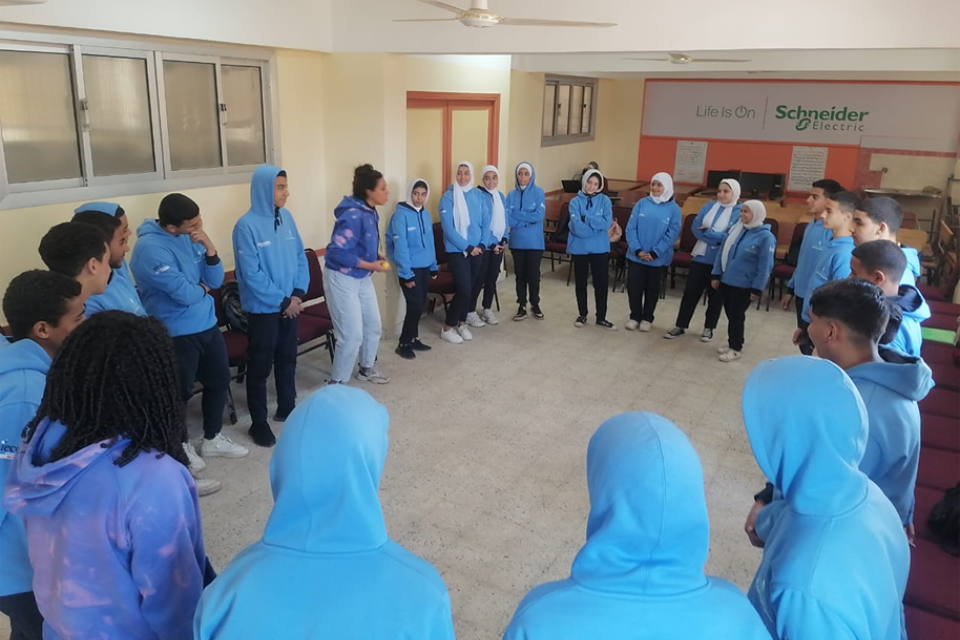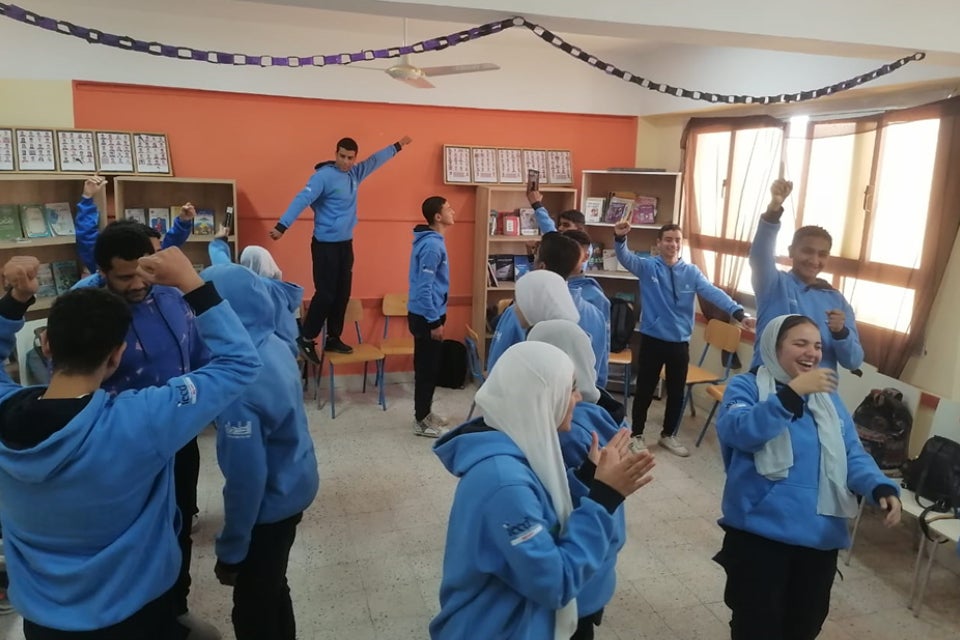Boys and girls take part in an interactive theatre performance around gender norms in Cairo
Date:
Author: Reem Akl
Participants: Grade 11 Students

In a bustling technical and vocational education and training (TVET) school in Cairo, students gathered to participate in a groundbreaking interactive theatre performance activity at ElectroMisr Applied Technology School. The performance was jointly implemented by UN Women in Egypt and the Institut Européen de Coopération et de Développement (IECD) under the Joint Programme on Promoting Productive Employment and Decent Work for Women in Egypt, Jordan and Palestine.
The activity encourages students to challenge gender norms and stereotypes that continue to hinder both boys and girls from realizing their full potential. This work is part of UN Women Egypt’s efforts to integrate women entrepreneurs in the retail industry, information technology sector through coding trainings, and to increase employment in Science, Technology, Engineering and Mathematics (STEM) areas and creative industries.
The performance targeted Grade 11 students and was a thought-provoking exploration of the harmful impact of gendered expectations. Through captivating scenes and interactive exercises, 44 students were invited to reflect on their own beliefs and attitudes surrounding gender equality and occupational segregation. The goal was to spark a dialogue around the ways in which gender norms can impact individuals and society at large and to inspire a commitment to challenging these harmful stereotypes. UN Women worked with local actors and educators from IECD to train the students, drawing on the experiences of young people in Egypt, particularly women and girls.
At the start of the day, students were first oriented on body and vocal languages in order to better familiarize themselves with the interactive theatre performance process. Students took part in multiple games and sessions that acquainted them with interactive theatre performances as a tool for social change through vocal and body expression and improvisation. These also included interaction techniques within a theatre performance.
One female student shared that the event helped her learn the importance of self-reliance in solving problems, stating, "I have learned to depend only on myself and to solve my own problems." On the other hand, the boys acknowledged that the event helped them understand gender equality and allowed them to engage in various interactive activities, including theatre performances that enabled them to overcome stage fright and enhance their public speaking skills. They also emphasized the need for more career coaching sessions and community awareness to break the stereotypes associated with Technical and Vocational Education and Training (TVET) students.
Students were given the opportunity to practice performing techniques and tackle challenging topics like violence, bullying, the right to access the employment field as technicians, and harassment against women and girls. For each performance, a reflection session took place where students engaged in a discussion around various subtopics related to gender norms and stereotypes.

By the end of the day, both groups rejoined and all students participated in various collective performances in front of their classmates, which left a lasting impression on everyone in attendance. This activity is part of a gender awareness series designed by UN Women and the local artists that is provided to school students and teachers. Additionally, female students also receive soft skills trainings and internships, ultimately tackling the environment where girls are learning and working.
Gender stereotypes and norms continue to limit the potential of both boys and girls in Egypt. Beyond the TVET school setting, interactive performances like these have the potential to spark lasting social change towards greater gender equality and empowerment. By engaging young people in conversations around gender equality, the performance inspires families and communities to rethink their own beliefs and attitudes. They are also provided with the tools and techniques necessary to challenge these beliefs. The training serves as a reminder that gender should never be a barrier to success, and that everyone deserves the chance to reach their full potential, regardless of their gender.
This activity was developed under the Joint Programme Work4Women. The programme seeks to address barriers through a comprehensive approach that works at the macro, meso, and micro levels, aiming to enhance productive employment and decent work for women in the region by promoting equitable laws and policies, engaging public, private, and community actors, and reducing the uneven burden of unpaid care work. It is jointly implemented by UN Women and the International Labour Organization (ILO) in the Arab states, and is made possible through the funding received from the Government of Sweden.
Lemonia Fokaidou, Engy Amin and Montira Narkvichien contributed to this article.
Implemented by: UN Women ECO
In partnership with: IECD/ILO/NCW/KOICA/Sweden
Location: ElectroMisr Applied Technology School– Cairo, Egypt
Training theme: Gender norms/gender stereotypes